Tears, laughs and bare butts beamed through portal linking Dublin and New York
NEW YORK and DUBLIN — It wowed crowds, joined up families and created more than a little controversy, but a new visual art installation linking New York and Dublin has certainly been a talker.
Called “The Portal,” a giant screen and video camera have been placed next to the Big Apple’s famed Flatiron Building and another in O’Connell Street, the Irish capital’s main thoroughfare.
Each sculpture broadcasts a livestream from the portal in the other city, allowing real time interaction between people on both sides of the Atlantic.
“It’s about meeting people who otherwise would never meet during our entire lifetime because they are just so far away from us, from our interests,” Benediktas Gylys, the creator, told NBC News in New York on Tuesday.
“It’s about recognizing those people, seeing that we all share more in common than what separates us,” added Gylys, who has set up a similar portal linking his native Lithuania with Poland.

After setting up the cross-Atlantic link between New York and Dublin last week, Gylys said it had “received 500 million people in just five days, which was beyond expectations.”
He added that the technology behind “The Portal” is similar to that used in webcams and video calls, but those methods of communication are typically restricted to people we already know.
When NBC News visited the Dublin “Portal” on Tuesday, some people danced while others played rock, paper, scissors with their American counterparts. Some simply waved hello.
School children sang the “New York” chorus of Alicia Keys and Jay Z’s “Empire State of Mind,” although the portal only transmits images, not sound.
Wearing a T-Shirt with a heart expressing her love for New York, student Aishat Bogunmbe said she thought it was “awesome that we have something that connects us to another country, especially in Ireland because we have a lot of connection to New York as a whole historically.”

In New York, Mark McConnell waved at his 57-year-old dad, Seamus, back home in Dublin.
“Very exciting, amazing, a bit surreal,” said Mark, 23, who is studying history and politics at Trinity College Dublin and was visiting his girlfriend. He added that his dad worked within walking distance of the Dublin portal and they thought they'd try it out.
“It’s something so simple but just so different. I know you can obviously do a video call but there’s something just very exciting about this,” the 23-year-old said. “I can’t quite put my finger on it.”
Brianna Jacobson, who said she worked nearby, also held up a sign for her friend Sarah whom she hadn’t seen in more than a year.
Asked if it made her day, she tearfully replied, “My month.”
After a busy weekend in Dublin, American and Irish news media reported that some had used “The Portal” for dubious purposes and videos circulating online showed a woman baring her breasts to the camera, a man mooning and others apparently taking drugs or pretending to.
As a result, the Dublin City Council said Tuesday that it was closing “The Portal” there due to “inappropriate behavior by a small minority of people.”
“Unfortunately the preferred solution, which would have involved blurring, was not satisfactory,” the council said in a statement, adding that it expected it would be switched back on later this week.
“The overwhelming majority of people interacting with the Dublin Portal have behaved appropriately,” it said.
Gylys said other portals are planned for Brazil and Ethiopia.
“People really need a sense of connectivity, a sense of meeting people outside our social bubbles, meeting people who are outside of our interest zones, outside of our social media,” he said.
Emilie Ikeda reported from New York, and Meagan Fitzgerald from Dublin.
